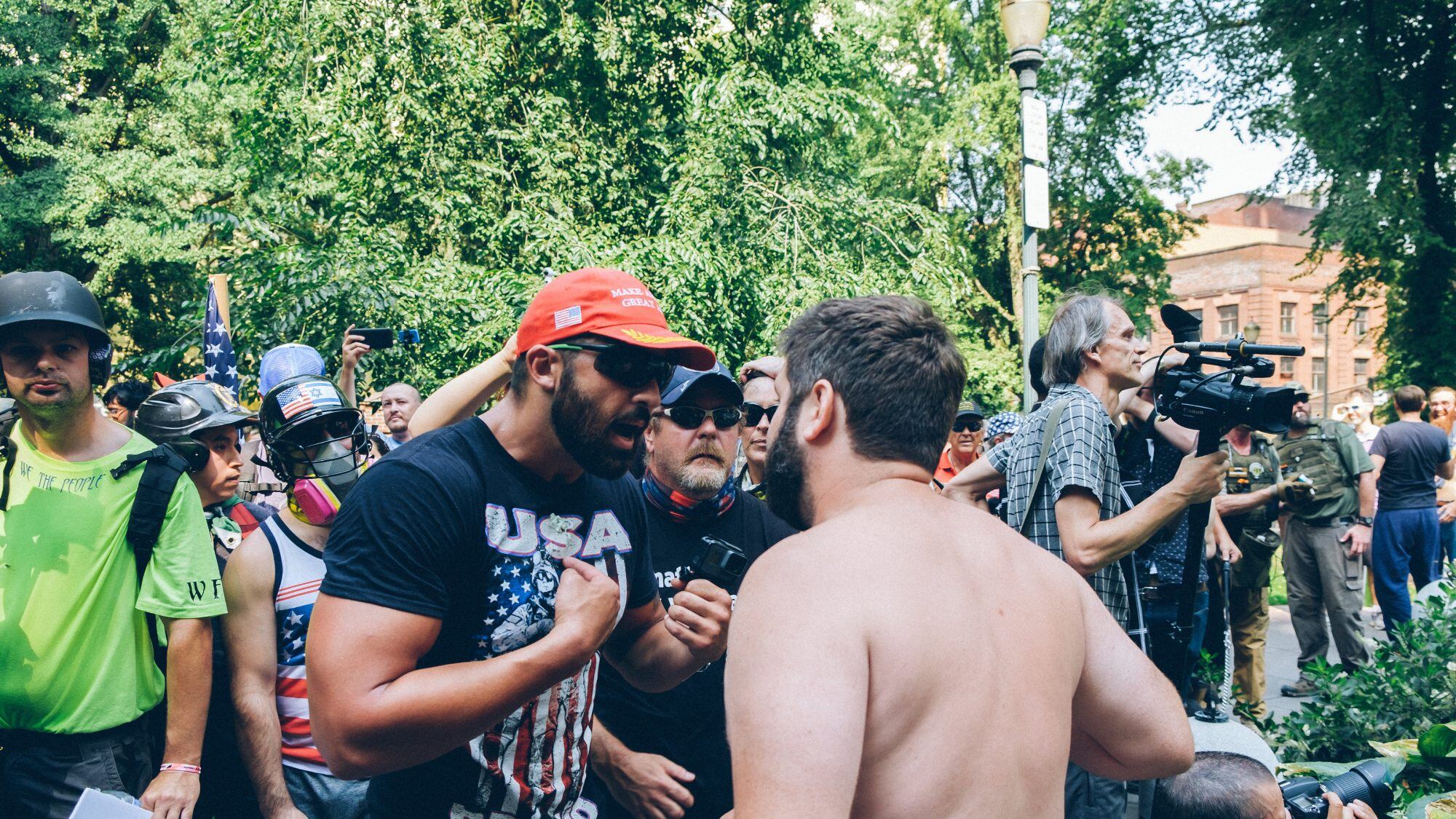Portland police and prosecutors have been talking about "mutual combat" for a long time in relation to brutal fistfights at far-right protests.
Today, WW reported that Mayor Ted Wheeler's office asked about the timeline for indicting right-wing extremists. Staff say police and prosecutors told them the perception of "mutual combat" made pursuing cases difficult. That term refers to two people agreeing to a physical altercation—like a boxing match, or a duel.
It's not a concept supported by Oregon law, legal experts tell WW. But it's one local law enforcement has been using for nearly a year.
One of the earliest mentions of the term dates back to Patriot Prayer leader Joey Gibson's Facebook Live video on June 18, 2018, promoting his Aug. 4 campaign rally.
“They’ve made it very clear,” Gibson says, “they’re kind of looking at it as mutual combat. Mutual combat is a law that basically states, something that happens a lot at bars and stuff, two guys go outside and they both want to fight—kind of like training or whatever—and no charges can be pressed.”
Text messages first reported by WW suggest a Portland police lieutenant told Gibson about the so-called "mutual combat" excuse right around the time the far-right leader posted that video.
Oregon law explicitly bans "mutual combat" as Gibson described it. A jury instruction says that both combatants being willing to fight is no defense in court. Subsection three of ORS 161.215 explains "a person is not justified in using physical force upon another person if: the physical force involved is the product of a combat by agreement not specifically authorized by law."
Oregon's law defining disorderly conduct also bans fights, saying a person can be found guilty of the misdemeanor if he "engages in fighting or in violent, tumultuous or threatening behavior."
Yet Lt. Jeff Niiya texted another Portland police officer on July 19, 2018, to provide information about conversations he'd had with Gibson about mutual combat. The text may have followed a story by The Daily Beast that reported Gibson's claims that Portland police gave his followers a green light to brawl with antifascists.
"Just throwing myself on the sword," Niiya texted another officer. "Joey called upset thinking I lied to him cause others could not find mutual combat in the law and thought I was making it up. I talked to Vasquez and clarified my understanding and my belief in ORS 161.215. He gave me info and I called Joey back. Hopefully it simmers down."
Niiya appears to be referring to Nathan Vasquez, a deputy district attorney in the Multnomah County District Attorney's Office who met with Mayor Ted Wheeler's staff to discuss why charges have rarely been brought against right-wing protesters caught on camera throwing punches.
Vasquez is also the prosecutor handling a recently re-opened case against Tusitala "Tiny" Toese and Donovon Flippo, two Proud Boys who allegedly assaulted a man on a Portland sidewalk in June, 2018.
Defense attorneys question the proposition that prosecutors cannot bring cases against people engaged in street fights.
"There is no mutual combat defense in the statute in this state," says Steven Sherlag, a criminal defense lawyer in Portland. "Sometimes it can be confusing as to who was the first aggressor and it can be confusing as to whether someone used too much force to defend themselves."
But Sherlag, who has reviewed video of an Oct. 13 street fight outside downtown bar Kelly's Olympian, says he does not understand why prosecutors would not take that case to court.
"That should be prosecuted, there's no question," he says. "What's mutual combat about that? When you're lying on the ground, there's no imminent threat. Someone who is stomping on someone's head should be prosecuted. That's a public safety issue."
Even the top brass in the Portland Police Bureau have publicly discussed mutual combat as a factor holding back prosecutions against right-wing extremists. In an interview with Oregon Public Broadcasting, Assistant Chief Ryan Lee explained that the perception of people being engaged in mutual combat can discourage prosecutors.
Lee said a criminal cases against two men involved in the particularly brutal October 13, 2018 incident hinge on "whether or not [prosecutors] are going to view that interaction as mutual combat, [or] whether they view that there is a temporal break and that the actions following on to the person being stomped was unreasonable in the mutual combat."
Meanwhile, prosecutors in Multnomah County frequently pursue criminal charges against left-leaning protesters who fail to obey police orders or clash with the cops.

